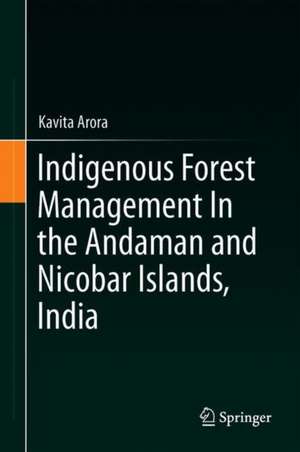Indigenous Forest Management In the Andaman and Nicobar Islands, India
Autor Kavita Aroraen Limba Engleză Hardback – 16 noi 2018
This book offers an extensive study of indigenous communities in the Andaman and Nicobar Islands, India, and their methods of forest conservation, along with an exploration of the impact of forestry operations in the islands and the wide scale damage they have incurred on both the land and the people. Through an in-depth analysis of the contrasting indigenous practices and governmental forestry schemes, the author has compared the modern ‘Joint Forest Management’ resolution with the ethos and practices of the indigenous people of the Andaman and Nicobar Islands. Throughout the book, readers will learn about the different indigenous communities inhabiting these islands and the treasure of knowledge each of them provide on forest conservation.
The book establishes that the notion of knowledge is politicized by the dominant culture in the context of Andaman’s forest tribes, and traces how this denial of the existence of indigenous knowledge by government officialshas led to reduced forest area in the region. The book also explores and analyses strategies to utilize and conserve the tribes' profound knowledge of the biodiversity of the islands and study their efforts towards forest conservation, protection and rejuvenation.
The book establishes that the notion of knowledge is politicized by the dominant culture in the context of Andaman’s forest tribes, and traces how this denial of the existence of indigenous knowledge by government officialshas led to reduced forest area in the region. The book also explores and analyses strategies to utilize and conserve the tribes' profound knowledge of the biodiversity of the islands and study their efforts towards forest conservation, protection and rejuvenation.
Preț: 643.84 lei
Preț vechi: 757.46 lei
-15% Nou
Puncte Express: 966
Preț estimativ în valută:
123.22€ • 127.29$ • 102.55£
123.22€ • 127.29$ • 102.55£
Carte tipărită la comandă
Livrare economică 26 martie-09 aprilie
Preluare comenzi: 021 569.72.76
Specificații
ISBN-13: 9783030000325
ISBN-10: 303000032X
Pagini: 233
Ilustrații: XIII, 222 p. 23 illus., 22 illus. in color.
Dimensiuni: 155 x 235 mm
Greutate: 0.51 kg
Ediția:1st ed. 2018
Editura: Springer International Publishing
Colecția Springer
Locul publicării:Cham, Switzerland
ISBN-10: 303000032X
Pagini: 233
Ilustrații: XIII, 222 p. 23 illus., 22 illus. in color.
Dimensiuni: 155 x 235 mm
Greutate: 0.51 kg
Ediția:1st ed. 2018
Editura: Springer International Publishing
Colecția Springer
Locul publicării:Cham, Switzerland
Cuprins
Chapter1. Introduction.- Chapter2. Forest Management by Andamanese.- Chapter3. The Nicobarese Tribes and their knowledge.- Chapter4. Notes from the Field.- Chapter5. Indian Forest Administration and People Participation in Forest Management.- Chapter6. Indigenous Knowledge and Intellectual Property Right: A Discussion in the context of Andaman Tribes.- Chapter7. Conclusion.
Notă biografică
Dr. Kavita Arora is an Assistant Professor in the Department of Geography at Shaheed Bhagat Singh College, University of Delhi. She is a political geographer by training and her research interests include development and environment related issues in South and Southeast Asia; and forest management, gender and tribal studies.
Textul de pe ultima copertă
This book offers an extensive study of indigenous communities in the Andaman and Nicobar Islands, India, and their methods of forest conservation, along with an exploration of the impact of forestry operations in the islands and the wide scale damage they have incurred on both the land and the people. Through an in-depth analysis of the contrasting indigenous practices and governmental forestry schemes, the author has compared the modern ‘Joint Forest Management’ resolution with the ethos and practices of the indigenous people of the Andaman and Nicobar Islands. Throughout the book, readers will learn about the different indigenous communities inhabiting these islands and the treasure of knowledge each of them provide on forest conservation.
The book establishes that the notion of knowledge is politicized by the dominant culture in the context of Andaman’s forest tribes, and traces how this denial of the existence of indigenous knowledge by government officials hasled to reduced forest area in the region. The book also explores and analyses strategies to utilize and conserve the tribes' profound knowledge of the biodiversity of the islands and study their efforts towards forest conservation, protection and rejuvenation.
The book establishes that the notion of knowledge is politicized by the dominant culture in the context of Andaman’s forest tribes, and traces how this denial of the existence of indigenous knowledge by government officials hasled to reduced forest area in the region. The book also explores and analyses strategies to utilize and conserve the tribes' profound knowledge of the biodiversity of the islands and study their efforts towards forest conservation, protection and rejuvenation.
Caracteristici
Compares indigenous knowledge with the modern scientific forest management system Maximizes readers insights into the tribes that inhabit these areas Critically examines how far the existing regime of intellectual property rights is capable of safeguarding the rights of indigenous people and their knowledge
